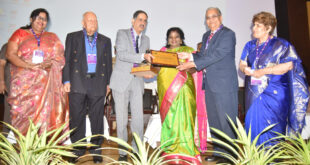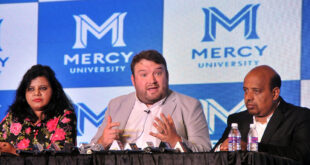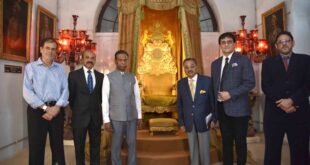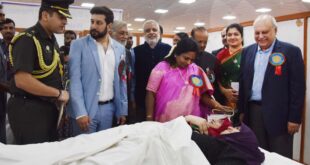By: Asad Mirza
The Draft National Education Policy (NEP) 2019 prepared by a committee chaired by Dr K. Kasturirangan was shared by the Ministry of Human Resource and Development for public comments in June earlier.
The policy aims at making India a knowledge superpower by equipping students with the necessary skills and knowledge. It also focuses on eliminating the shortage of manpower in Science and Technology, academics and industry. The Draft Policy is built on foundational pillars of Access, Equity, Quality, Affordability and Accountability.
The NEP 2019 found it drawn into a high-profile controversy soon after the ministry of human resources development posted it online for soliciting feedback. The point of contention: the NEP’s recommendation that Hindi be mandated as one of the three languages of study in school. The opposition in south India, especially in the state of Tamil Nadu, was so strong that the NEP committee swiftly withdrew the linguistic policy mandate at issue.
However, a further critical study of the 484-page NEP 2019 reveals an issue deserving of wider, more heated opposition. The words “secular” or “secularism” are not found anywhere the NEP 2019.
The NEP is expected to change the government funding on education, the structure of school education, the curricular design for school and higher education, the nature of teacher training and recruitment, among others. A clear, reference to secular education however was vital to see as the base for these ambitious reform proposals.
The absence of the word “secular” in the NEP 2019 becomes all the more pronounced when the National Policy on Education (NPE) 1986, which laid down the policy framework which guides the Indian education system at present, the National Curricular Framework (NCF) 2005, which formed the basis of the revision of the National Council Of Educational Research And Training (NCERT) textbooks, and the National Curricular Framework for Teacher Education (NCFTF) 2009 are brought into view.
In contrast to the earlier policies of mentioning secularism as a core Indian value for the Indian education, the omission of the words “secular” and “secularism” in the NEP 2019 is odd.
Indeed, the NEP’s frequent affirmation of its aim of inculcating constitutional values in education makes it doubly odd.
Consider the classic claim that the NEP makes and the non-mention of secularism in the long list of constitutional values it tries to preach: “The process and the content of education at all levels will also aim to develop Constitutional values in all students, and the capacities for their practice.
This goal will inform the curriculum as well as the overall culture and environment of every school. Some of these Constitutional values are: democratic outlook and commitment to liberty and freedom; equality, justice, and fairness; embracing diversity, plurality, and inclusion; humaneness and fraternal spirit; social responsibility and the spirit of service; ethics of integrity and honesty; scientific temper and commitment to rational and public dialogue; peace; social action through Constitutional means; unity and integrity of the nation, and a true rootedness and pride in India with a forward-looking spirit to continuously improve as a nation.”
The non-inclusion of secularism is also seen found at several other places, where it similarly affirms the significance of the constitutional values for education.
The absence of a clear commitment to secular ideals simply does not guarantee that the other ideals of pluralism and diversity that the NEP 2019 abides by will be realised.
The NEP 2019 proposals for incorporating “ethical and moral principles and values” in school education, and the examples of those values that it offers, however, clarify that it makes explicit space for using religious texts in the classroom.
This constitutes a departure from the existing model of secular education in the country and violates constitutional guarantee, which states, “no religious instruction is to be provided in any educational institution wholly maintained out of state funds (Article 28 (1))”.
Though under the new policy religious instruction is kept out of government schools, the practice of secular education in India has not meant an absence of “religious” texts in the classroom.
For example, the language and literature textbooks make space for devotional poems. The poetry of bhakti saints like Basava, Tulsidas, Kabir, Mirabhai and Soordas, and Sufi poets and saints like Malik Muhammad Jayasi and Shishunala Sharif, or Christian hymns like Lead Kindly Light by John Henry Newman are features of Indian textbooks.
In the section titled ‘Incorporation of basic ethical and moral reasoning throughout the school curriculum’, it declares that “traditional Indian values of seva, ahimsa, swacchata, satya, nishkam karma, tolerance, honest hard work, respect for women, respect for elders, respect for all people and their inherent capabilities regardless of background, respect for environment, etc. will be inculcated in students.”
The traditional Indian values listed above are a mix of generic values expressed in English like respect towards women and the elderly and specific values expressed in Sanskrit such as seva, satya and ahimsa. The lexical meaning of them makes symbolic place for the Buddhist, Hindu and Jain religious traditions, but not for the Islamic and Christian streams of Indian tradition.
The exclusion of Christian and Islamic traditions of India is consistent whenever moral instruction is discussed in the NEP.
This list of known Hindu and common values offers no guarantee that a sincere diversity in relation to the Indian faith traditions will guide the choice of texts for discussing them. Making space for the Islamic value of charity (zakat) and the Christian value of compassion, for instance, in that list would have been more reassuring.
Giving due space to diverse faith traditions in the moral curricula ensures that students from certain religious backgrounds are not alienated in the classroom.
The encounter with the moral imagination of diverse faiths enriches the humane side of all students.
In contemporary India, which has seen a sharp rise in caste and religious violence, the curriculum and teaching methods in Indian classrooms clearly have a dominant role to play in making caste and religious prejudice in society irrelevant. The challenge is to find fresh and creative ways of making young minds grasp these difficult social realities. Seriousness in this regard should have been integral to the NEP 2019.
Apart from ignoring secularism as a guiding ideal the draft policy points to a number of risks and challenges for many religious, caste and tribal communities in the country. Instead of inculcating a citizenship experience, it weakens the learning experience for all. It harms Indian culture.
Asad Mirza is a Sr journalist based in New Delhi. In his career spanning more than 20 years, he was also associated with BBC Urdu Service and Khaleej Times of Dubai. He writes on Muslims, educational and international affairs issues. He may be reached at asad.mirza.nd@gmail.com
Disclaimer: The views expressed are author’s own and do not necessarily represent the views of the publication.
 Gawah (The Witness) – Latest News, Current Affairs, Politics, Sports, Religion, Literature, Technology, Education, National, Local – Hyderabad Telangana India World Fearless By Birth, Pristine by Choice – First National Urdu Weekly From South India – Latest News, Breaking News, Special Stories, Interviews, Islamic, World, India, National News
Gawah (The Witness) – Latest News, Current Affairs, Politics, Sports, Religion, Literature, Technology, Education, National, Local – Hyderabad Telangana India World Fearless By Birth, Pristine by Choice – First National Urdu Weekly From South India – Latest News, Breaking News, Special Stories, Interviews, Islamic, World, India, National News





